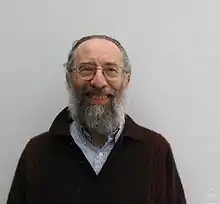Richard A. Shore | |
|---|---|
 | |
| Born | August 18, 1946 (age 77) |
| Citizenship | American |
| Alma mater | MIT |
| Scientific career | |
| Fields | Mathematics |
| Institutions | Cornell University |
| Thesis | Priority Arguments in Alpha-Recursion Theory (1972) |
| Doctoral advisor | Gerald E. Sacks |
Richard Arnold Shore (born August 18, 1946) is a professor of mathematics at Cornell University who works in recursion theory. He is particularly known for his work on , the partial order of the Turing degrees.
- Shore settled the Rogers homogeneity conjecture by showing that there are Turing degrees and such that and , the structures of the degrees above and respectively, are not isomorphic.[1]
- In joint work with Theodore Slaman, Shore showed that the Turing jump is definable in .[2]
Career
He was, in 1983, an invited speaker at the International Congress of Mathematicians in Warsaw and gave a talk The Degrees of Unsolvability: the Ordering of Functions by Relative Computability. In 2009, he was the Gödel Lecturer (Reverse mathematics: the playground of logic).[3] He was an editor from 1984 to 1993 of the Journal of Symbolic Logic and from 1993 to 2000 of the Bulletin of Symbolic Logic. In 2012, he became a fellow of the American Mathematical Society.[4]
References
- ↑ Shore, R.A. (1979). "The homogeneity conjecture". Proceedings of the National Academy of Sciences of the United States of America. 76 (9): 4218–4219. Bibcode:1979PNAS...76.4218S. doi:10.1073/pnas.76.9.4218. JSTOR 70054. PMC 411543. PMID 16592707.
- ↑ Shore, R.A.; Slaman, T.A. (1999). "Defining the Turing jump". Math. Res. Lett. 6 (5–6): 711–722. doi:10.4310/MRL.1999.v6.n6.a10.
- ↑ Gödel Lectures, Association for Symbolic Logic
- ↑ List of Fellows of the American Mathematical Society, retrieved 2013-07-18.
External links
This article is issued from Wikipedia. The text is licensed under Creative Commons - Attribution - Sharealike. Additional terms may apply for the media files.